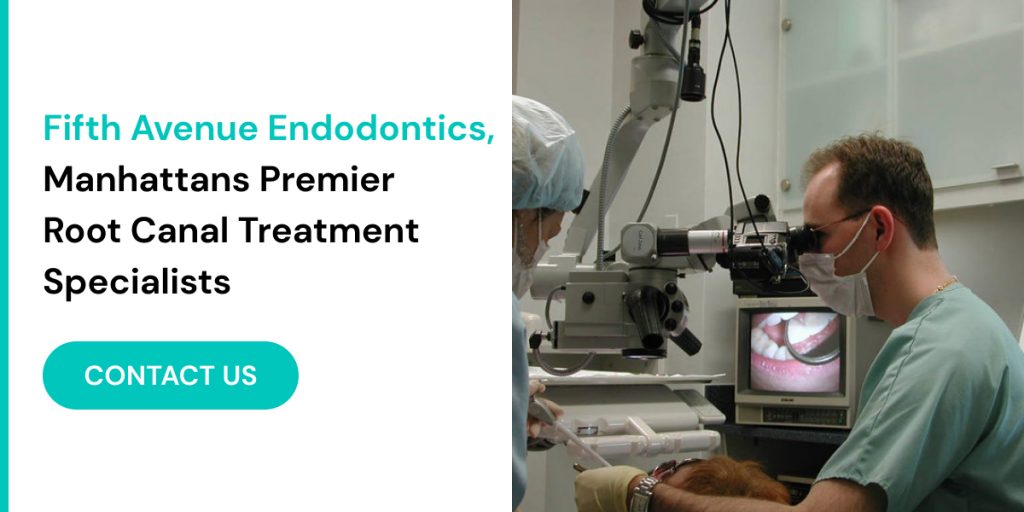Endodontic treatment, commonly known as root canal therapy, is a specialized field of dentistry dedicated to addressing issues that arise within the tooth’s inner tissues, known as the dental pulp. This area of dentistry plays a crucial role in preserving natural teeth by removing infected or damaged pulp and sealing the tooth to prevent further complications. Despite its critical importance, many patients remain unaware of what endodontic therapy involves and how it can be a lifeline for their natural teeth.
At Fifth Avenue Endodontic in Midtown Manhattan, Dr. Iofin underscores the vital need for endodontic education and awareness. Educating patients about the procedure helps demystify root canal therapy, reducing anxiety and encouraging timely treatment. By understanding the procedure’s benefits—such as pain relief, infection control, and tooth preservation—patients are more likely to seek care before conditions escalate.
Dr. Iofin also highlights the importance of informing other dental professionals about advancements in endodontics. Continued education for general dentists and specialists ensures that all practitioners can provide informed referrals and comprehensive care, ultimately enhancing overall patient outcomes and promoting better oral health.
Understanding Endodontics: What Does an Endodontist Do?
An endodontist is a highly specialized dentist focused on diagnosing and treating conditions related to the dental pulp, the soft tissue inside the tooth, and the surrounding tissues. The role of an endodontist is critical in preserving the health of the tooth and preventing the spread of infection, making their expertise vital for maintaining overall oral health.
Unlike general dentists, endodontists receive additional training beyond dental school to become experts in the intricate anatomy of the tooth and the management of complex cases. This advanced training includes in-depth knowledge of the root canal system, the treatment of traumatic dental injuries, and the resolution of persistent pain that may arise from the tooth’s internal structures.
One of the primary procedures performed by endodontists is root canal therapy. This procedure involves the removal of infected or damaged pulp tissue from inside the tooth, followed by cleaning, shaping, and sealing the root canals to prevent future infection. This process is essential for saving teeth that might otherwise need to be extracted.
In addition to root canal therapy, endodontists are skilled in endodontic retreatment. This involves redoing a previous root canal procedure that has failed, often due to untreated or newly developed issues. Endodontists also perform surgical interventions, such as apicoectomies, where the tip of the tooth’s root is removed to address persistent infections.
Endodontists, like those at Fifth Avenue Endodontic in Midtown Manhattan, also utilize advanced technology, such as digital imaging and microscopic tools, to enhance the accuracy and effectiveness of their treatments. By focusing on the most intricate aspects of dental care, endodontists play a crucial role in saving teeth and alleviating pain, contributing significantly to the field of dentistry.

The Role of an Endodontist in Midtown Manhattan
In the vibrant and fast-paced environment of Midtown Manhattan, access to specialized dental care is not just a convenience but a necessity. An endodontist in this dynamic area, such as Dr. Iofin at Fifth Avenue Endodontic, plays a crucial role in addressing complex dental issues that go beyond the scope of general dentistry. The specialized services provided by endodontists are essential for maintaining the health and longevity of patients’ natural teeth, which is particularly important in a bustling city where maintaining good health is a priority.
Endodontists in Midtown Manhattan, like Dr. Iofin, are experts in diagnosing and treating conditions related to the dental pulp and root structures of the teeth. These specialists are often called upon to perform intricate procedures such as root canal therapy, which involves removing infected or damaged pulp tissue from within the tooth. This procedure is vital for saving teeth that might otherwise be lost due to severe infection or trauma. By preserving natural teeth, endodontists help prevent the need for more extensive restorative treatments and maintain the integrity of the patient’s bite and oral function.
Additionally, endodontists in this area address issues that arise from various factors, including the city’s unique lifestyle and stressors, which can contribute to dental problems. They play a pivotal role in alleviating pain, preventing the spread of infection, and providing relief from symptoms caused by dental pulp issues. Their work ensures that patients can continue their daily lives without the discomfort or complications associated with untreated dental conditions.
Furthermore, endodontists like Dr. Iofin also contribute to overall oral health by collaborating with general dentists and other specialists. This collaborative approach helps ensure comprehensive care and optimal outcomes for patients. In a city known for its high-paced lifestyle, having access to expert endodontic care helps residents maintain their dental health amidst their busy schedules.
Why Endodontic Education Matters
Endodontic education is crucial for a multitude of reasons, primarily because it directly impacts patient outcomes and overall oral health. One of the main benefits of endodontic education is its role in demystifying the root canal procedure. Root canal therapy is often shrouded in misconceptions and fear, largely due to a lack of understanding. Many patients perceive the procedure as painful or overly complex, which can deter them from seeking necessary treatment. By providing clear, accurate information about what to expect during and after a root canal, endodontic education can alleviate these fears. When patients are informed about the modern techniques, pain management options, and success rates associated with root canals, they are more likely to pursue the treatment in a timely manner, thus preserving their natural teeth and avoiding more severe complications.
Another significant aspect of endodontic education is its impact on promoting better oral hygiene practices. When patients understand the importance of maintaining the health of their dental pulp and the role it plays in overall oral health, they are more likely to engage in preventative care. Educated patients are more inclined to adhere to recommended practices, such as regular dental check-ups, thorough brushing and flossing routines, and timely treatment of dental issues. This proactive approach helps prevent the need for complex endodontic procedures by addressing potential problems before they escalate.
Furthermore, endodontic education fosters better communication between patients and dental professionals. It enables patients to ask informed questions, discuss their treatment options in detail, and understand the rationale behind recommended procedures. This collaborative approach enhances trust and ensures that patients are active participants in their dental care, leading to better treatment outcomes and overall satisfaction.
Dispelling Myths and Misconceptions
One of the most significant challenges endodontists face is overcoming the widespread myths and misconceptions surrounding root canal treatment. Despite its crucial role in saving teeth and alleviating pain, root canal therapy is often misunderstood and associated with unnecessary fear and discomfort. These misconceptions can lead to anxiety, procrastination, and ultimately, more severe dental issues when patients delay seeking treatment.
A common myth is that root canal treatment is excessively painful. This misconception likely stems from outdated information and past experiences before modern techniques and anesthesia were developed. In reality, advancements in endodontic techniques and pain management have significantly improved the comfort and efficiency of the procedure. For instance, modern anesthesia options ensure that patients experience minimal discomfort during the procedure. Dr. Iofin and other endodontists at Fifth Avenue Endodontic employ advanced technology and refined techniques to minimize pain and enhance patient comfort, making the treatment as stress-free as possible.
Another misconception is that root canal therapy is a last resort or a sign of a failed tooth. On the contrary, a root canal is a highly effective procedure designed to save a tooth that has been compromised by infection or severe damage. It allows patients to retain their natural tooth, which is beneficial for maintaining proper oral function and alignment. Educating patients about the purpose and benefits of root canals helps dispel the notion that they are only needed when a tooth is beyond saving.
Furthermore, many people believe that root canal therapy is associated with long recovery times and significant aftercare. In reality, most patients experience only minor discomfort and can resume normal activities relatively quickly. By providing accurate information about the procedure and its benefits, Dr. Iofin helps patients make informed decisions, reduces their anxiety, and encourages them to seek timely care, ultimately improving their dental health outcomes.
The Impact of Endodontic Awareness on Treatment Outcomes
The level of awareness patients have regarding endodontic treatment options plays a crucial role in their overall dental health and treatment outcomes. When patients are well-informed about the signs and symptoms of dental pulp issues and the available treatment options, they are better equipped to make proactive decisions about their oral health. This proactive approach can significantly impact the effectiveness of the treatment and the overall success of their dental care.
Awareness of key symptoms such as prolonged tooth sensitivity, persistent tooth pain, swelling, or discoloration of the tooth is essential. These symptoms often indicate underlying issues with the dental pulp, which can develop into more severe problems if left untreated. When patients recognize these signs early, they are more likely to seek timely evaluation and intervention from an endodontist. This early detection and treatment are crucial because they allow for the management of the condition before it escalates.
Early intervention typically results in more straightforward and less invasive treatments. For instance, addressing a pulp issue early on can often be managed with a single root canal procedure, as opposed to more complex and extensive treatments that might be required if the infection spreads or the tooth suffers additional damage. The sooner the treatment is initiated, the less likely it is that complications will arise, leading to better overall outcomes.
Moreover, patients who are knowledgeable about endodontic care are more likely to follow through with recommended treatments and adhere to post-procedure care instructions. This adherence further enhances the likelihood of successful treatment and reduces the risk of recurrence. By educating patients about the importance of early intervention and providing clear information on treatment options, endodontists can significantly improve treatment outcomes and promote long-term dental health.
The Role of Technology in Endodontic Education
Advancements in dental technology have profoundly transformed how endodontic procedures are explained and understood by patients. High-definition imaging, 3D scans, and digital models have become invaluable tools in endodontic education, significantly enhancing the ability to convey complex information in an accessible and comprehensible manner.
High-definition imaging provides clear and detailed visuals of the tooth’s internal structures, allowing both patients and endodontists to examine the extent of any issues with greater precision. This clarity helps patients better understand their condition and the necessity of the proposed treatments. Similarly, 3D scans offer a comprehensive view of the tooth and surrounding structures, giving a more accurate representation of the problem area and the treatment plan.
Digital models further contribute to patient education by offering interactive visualizations. These models can show the step-by-step process of endodontic procedures, helping patients grasp the treatment approach and its benefits. At Fifth Avenue Endodontic, Dr. Iofin leverages these advanced technologies to provide thorough consultations. By using high-definition imaging and 3D scans, Dr. Iofin can create personalized treatment plans that are tailored to each patient’s unique needs, ensuring that they are well-informed and confident in their care decisions.
Continuing Education for Dental Professionals
Endodontic education is not just for patients; it is equally important for dental professionals. Continuing education ensures that endodontists stay updated with the latest techniques, technologies, and research in the field. This ongoing learning process is crucial for providing the highest quality of care and improving patient outcomes.
Collaboration Between General Dentists and Endodontists
Effective endodontic treatment often involves collaboration between general dentists and endodontists. General dentists play a key role in identifying potential endodontic issues and referring patients to specialists like those at Fifth Avenue Endodontic. Understanding the scope of endodontic practice and the latest advancements in the field enables general dentists to provide better initial assessments and referrals.
Educating the Community: Outreach and Resources
Raising awareness about endodontics within the community is an ongoing effort that requires accessible resources and outreach initiatives. Endodontic practices, such as Fifth Avenue Endodontic, can provide educational materials, host informational seminars, and engage with the community through social media and other platforms.
Patient Testimonials and Success Stories
One effective way to educate and reassure potential patients is by sharing testimonials and success stories. Hearing from individuals who have undergone endodontic treatment and experienced positive outcomes can help reduce anxiety and build trust in the procedure. At Fifth Avenue Endodontic, many patients have shared their stories of relief and recovery after treatment with Dr. Iofin, highlighting the importance of seeking specialized care.

The Future of Endodontic Education
As the field of endodontics continues to evolve, so too must the approaches to education and awareness. Incorporating digital tools, interactive platforms, and personalized patient education will be crucial in meeting the needs of future generations. Ongoing research and advancements in the field will also play a vital role in shaping the future of endodontic practice.
The Role of Professional Organizations
Professional organizations, such as the American Association of Endodontists (AAE), play a significant role in promoting endodontic education and awareness. These organizations provide resources for both patients and dental professionals, support research initiatives, and advocate for advancements in endodontic care.
Conclusion: Empowering Patients Through Education
In conclusion, the importance of endodontic education and awareness cannot be overstated. By understanding the role of an endodontist in Midtown Manhattan, patients can make informed decisions about their oral health and seek timely, effective treatment. Fifth Avenue Endodontic, under the expert care of Dr. Iofin, is dedicated to providing comprehensive endodontic care and promoting education within the community. By dispelling myths, embracing technology, and fostering collaboration, the field of endodontics can continue to evolve and improve patient outcomes for years to come.

